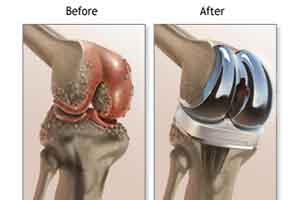- Home
- Editorial
- News
- Practice Guidelines
- Anesthesiology Guidelines
- Cancer Guidelines
- Cardiac Sciences Guidelines
- Critical Care Guidelines
- Dentistry Guidelines
- Dermatology Guidelines
- Diabetes and Endo Guidelines
- Diagnostics Guidelines
- ENT Guidelines
- Featured Practice Guidelines
- Gastroenterology Guidelines
- Geriatrics Guidelines
- Medicine Guidelines
- Nephrology Guidelines
- Neurosciences Guidelines
- Obs and Gynae Guidelines
- Ophthalmology Guidelines
- Orthopaedics Guidelines
- Paediatrics Guidelines
- Psychiatry Guidelines
- Pulmonology Guidelines
- Radiology Guidelines
- Surgery Guidelines
- Urology Guidelines
Knee replacement outcomes in patients with obesity: Journal of the American Academy of Orthopaedic Surgeons Study

Obesity affects 35 percent of the adult population in the U.S. A new literature review published in the Journal of the American Academy of Orthopaedic Surgeons (JAAOS) identifies strategies to improve total knee replacement (TKR) outcomes in patients with obesity.
TKR is a common orthopaedic procedure that is used to replace the damaged or worn surfaces of the knee, often caused by injury or osteoarthritis, to decrease pain and restore mobility for patients.
"Until recently, little was known about the outcomes of patients with obesity undergoing TKR," said lead study author and orthopaedic hip and knee surgeon J. Ryan Martin, MD. "We sought to review what information is known and what areas need further investigation."
According to the current review, prior to surgery, patients should:
- Be aware of, and try to manage, any chronic conditions, such as high blood pressure or diabetes.
- Decrease their body mass index (BMI), a measure of body fat based on weight in relation to height (a person whose BMI is greater than 30 kg/m2 is considered to have obesity).
- Undergo testing for nutritional deficiencies to improve their surgical results. Malnutrition is common in people with obesity as well as in patients who are on low-calorie diets to lose weight. This could lead to poor wound healing and infection.
Researchers also found that excess soft tissue in patients with obesity can obstruct visibility in the treatment site during surgery. This lack of visibility can result in difficulty achieving proper alignment and implant fixation as well as longer surgical time. Techniques such as computer-assisted alignment may expedite surgery, and minimize complications.
Post-surgery, patients with obesity are at high risk for revision because of decreased longevity of implants and an elevated risk of infection. Currently, no study has evaluated methods for decreasing these complications, but data suggests it may be beneficial to utilize implants with improved fixation.
"Although further research is needed, this review has allowed us to identify a variety of treatment methods to improve outcomes and reduce complications in patients with obesity," said Dr. Martin. "We reviewed the most recent studies on obesity to provide perioperative guidance to improve and optimize outcomes based on our current evidence-based review."
You can read the full Article by clicking on the link :
J. Ryan Martin, Jason M. Jennings, Douglas A. Dennis. Morbid Obesity and Total Knee Arthroplasty. Journal of the American Academy of Orthopaedic Surgeons, 2017; 25 (3): 188 DOI: 10.5435/JAAOS-D-15-00684

Disclaimer: This site is primarily intended for healthcare professionals. Any content/information on this website does not replace the advice of medical and/or health professionals and should not be construed as medical/diagnostic advice/endorsement or prescription. Use of this site is subject to our terms of use, privacy policy, advertisement policy. © 2020 Minerva Medical Treatment Pvt Ltd